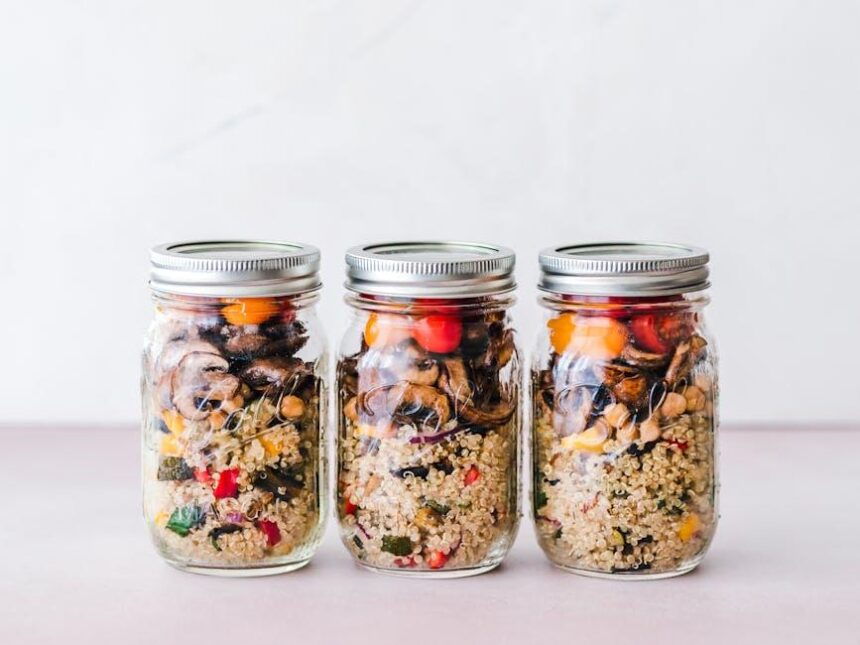In a world brimming with convenience, processed foods have become the silent architects of our daily diets-quick to prepare, easy to access, and often irresistibly flavored. Yet, beyond their colorful packaging and shelf stability lies a complex web of health and lifestyle consequences. Choosing to ditch processed foods is more than just a dietary shift; it’s a subtle revolution that reshapes how we eat, feel, and live. This article explores the lifestyle impact of stepping away from processed fare, revealing how such a change can ripple through our energy levels, relationships with food, and even our broader sense of well-being.
The Transformation of Energy and Vitality through Whole Foods

Embracing whole foods unleashes a profound shift in how our bodies and minds respond to daily demands. Unlike processed alternatives that often leave us feeling sluggish, whole foods are packed with naturally occurring vitamins, minerals, and antioxidants that nourish every cell. This nutrient density translates to steadier energy, improved mental clarity, and enhanced immune resilience. The ripple effect is clear: meals become a source of vitality rather than a temporary pick-me-up, fostering sustained alertness and reducing the mid-afternoon energy crashes that plague so many.
The transition to whole foods impacts more than just energy-it redefines the relationship between food and wellness through simple, tangible changes:
- Improved digestion and balanced blood sugar
- Enhanced mood stability and mental focus
- Reduction in inflammation and chronic fatigue sensations
| Benefit | Processed Foods | Whole Foods |
|---|---|---|
| Energy Levels | Spikes and crashes | Consistent and sustained |
| Focus & Clarity | Foggy, distracted | Sharp and alert |
| Inflammation | Often elevated | Generally reduced |
This fundamental change not only revitalizes the body but also ignites a deeper sense of well-being, making every meal a deliberate act of health and harmony.
How Ditching Processed Ingredients Enhances Mental Clarity

Shifting away from processed ingredients often leads to a remarkable boost in mental clarity. These artificial additives and refined sugars can cause sudden spikes and crashes in blood sugar levels, creating a foggy mind and difficulty concentrating. By eliminating these disruptive elements, your brain receives a steadier supply of nutrients, promoting sustained focus and a sharper thought process. This improved mental state is often accompanied by reduced feelings of anxiety and mood swings, paving the way for a calmer and more balanced day.
Beyond just brain fog, the benefits extend to overall cognitive performance, supported by a diet rich in whole foods. Consider the following mental improvements when you prioritize natural nourishment:
- Enhanced memory retention through stable glucose levels
- Reduced inflammation that slows cognitive decline
- Balanced neurotransmitter production for better mood regulation
- Consistent energy flow mitigating midday crashes
| Processed Components | Impact on Brain | Whole Food Benefit |
|---|---|---|
| High-fructose corn syrup | Glucose spikes, brain fog | Stable energy, clearer thoughts |
| Artificial preservatives | Neuroinflammation | Reduced inflammation, improved focus |
| Excess sodium | Increased cortisol levels | Balanced stress response, calmness |
Rebuilding Gut Health with Natural Nutrition Choices

Transforming your diet by steering clear of processed foods paves the way for a thriving gut environment. Whole, natural foods such as fresh vegetables, fruits, nuts, seeds, and fermented items bring a bounty of fiber, antioxidants, and beneficial bacteria to your digestive system. These elements fuel the growth of healthy gut flora, which plays a crucial role in nutrient absorption, immune function, and even mood regulation. Over time, this shift can lead to reduced inflammation, balanced digestion, and enhanced energy levels, fostering a vibrant connection between your gut and overall wellbeing.
Incorporating these natural nutrition choices daily is simpler than it seems. Consider embracing:
- Fiber-rich vegetables like broccoli, kale, and carrots
- Probiotic-rich foods such as yogurt, kefir, and sauerkraut
- Healthy fats from sources like avocados, olive oil, and walnuts
- Whole grains like quinoa, brown rice, and oats
- Hydrating fruits including berries, apples, and citrus
| Food Category | Gut Benefit | Example |
|---|---|---|
| Prebiotics | Feeds beneficial bacteria | Garlic |
| Probiotics | Replenishes good microbes | Kimchi |
| Fiber | Promotes regularity | Flaxseeds |
Practical Steps to Transition Smoothly to an Unprocessed Lifestyle

Begin your journey by embracing the beauty of simplicity in your meals. Start with small swaps-replace refined sugars with natural sweeteners like honey or maple syrup, and opt for whole grains over processed alternatives. Gradually introduce more fresh fruits, vegetables, nuts, and seeds into your daily diet. Planning your meals ahead can reduce the temptation of grabbing quick processed options. Keep your pantry stocked with wholesome staples like beans, lentils, and brown rice. Don’t forget: hydration plays a vital role, so prioritize water and herbal teas over sugary beverages.
Transitioning also means nurturing your cooking skills and creativity. Experiment with herbs and spices to make meals flavorful without artificial additives. Set aside time to prepare batches of homemade sauces and dressings, which serve as versatile bases for a variety of dishes. Surround yourself with a supportive community-whether online or local-to share recipes and encouragement. Below is a simple guide to help you swap common processed items for nutritious alternatives:
| Processed Item | Unprocessed Alternative |
|---|---|
| Store-bought salad dressing | Olive oil & lemon juice blend |
| Instant noodles | Whole grain pasta & fresh veggies |
| Packaged snack bars | Homemade energy balls (dates & nuts) |
| Flavored yogurt | Plain yogurt with fresh fruit |
Closing Remarks
Choosing to ditch processed foods is more than just a dietary shift-it’s an invitation to rediscover the rhythms of natural living. As the convenience of packaged meals fades, a newfound appreciation for whole ingredients and mindful eating often emerges. This lifestyle change can ripple beyond the kitchen, influencing energy levels, mental clarity, and even social connections around food. While the transition may present challenges, the journey toward unprocessed nourishment offers a compelling path to enhanced well-being and a deeper connection to the food that fuels us. In the end, embracing simplicity on the plate can lead to a richer, more vibrant life experience.











